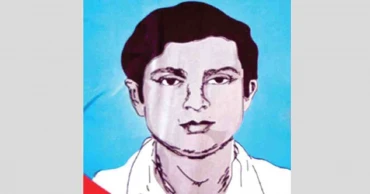premier
Shaheed Dr Milon Day today
Shaheed Dr Milon Day is being observed across the country onSunday, commemorating the 32nd martyrdom anniversary of Dr Shamsul Alam Khan Milon who was killed during the 90s’ anti-autocratic movement.
Different socio-cultural and political organisations as well as professional bodies have chalked out various programmes to observe the day with due respect.
The day's programmes include placing wreaths at the grave of Shaheed Dr Milon on the Dhaka Medical College campus, offering 'fateha' there and holding discussions to mark the day.
On this day in 1990, Dr Milon, the then joint secretary general of Bangladesh Medical Association (BMA) and a teacher of Dhaka Medical College, was shot dead by gunmen near TSC on the Dhaka University campus on his way to a meeting against then autocratic ruler HM Ershad.
Read more: Shaheed Dr Milon Day on Friday
The movement got momentum following the martyrdom of Dr Milon and autocratic ruler Ershad had to quit power finally in the face of a vigorous mass movement.
President Abdul Hamid and Prime Minister Sheikh Hasina, in separate messages, paid homage to Shaheed Dr Milon, recalling his supreme sacrifice for the restoration of democracy in the country.
In his message, the President expected that being imbued with the ideology of Dr Milon the new generation will engage themselves in the democratic practices.
"Democracy and development are complementary to each other. The advancement of democracy must also be accelerated to ensure sustainable development,"he said.
Prime Minister Sheikh Hasina, in her message, the anti-autocracy movement got new speed through the supreme sacrifice of Dr Milon.
Read more: Shaheed Dr Milon Day on Saturday
"Emergency was declared on the day, but denying the emergency and curfew, students and mass people brought out processions on the streets several times. Later, the autocratic ruler was forced to quit and democracy was restored," she added.
3 years ago
Reformist leader Anwar close to becoming Malaysia's next PM
Reformist opposition leader Anwar Ibrahim edged closer to become Malaysia's new prime minister after a political party agreed Thursday to support a unity government following inconclusive general elections.
Any agreement must still be approved by Malaysia's king. Last Saturday's divisive election led to a hung parliament that renewed a leadership crisis in Malaysia, which had three prime ministers since 2018. Police have tightened security nationwide as social media warned of racial troubles if Anwar’s multiethnic bloc wins.
Anwar's Pakatan Harapan, or Alliance of Hope, topped the race with 82 parliamentary seats, short of the 112 needed for a majority. Former Prime Minister Muhyiddin’s Malay-centric Perikatan Nasional, or National Alliance, won 73 seats. The alliance led by the United Malays National Organization, which has 30 seats, hold the key that will tilt the balance.
UMNO reversed its decision to remain in the opposition, saying it will heed the king's proposal for a unity government.
UMNO's secretary-general Ahmad Maslan said Thursday the party's highest-decision making body has decided to now support a unity government that is not led by Muhyiddin's camp. He said the party will accept any unity government or any other form of government decided by the king.
UMNO holds 26 seats and four others are held by component parties in its National Front alliance. It is unclear if the other party members have agreed to go along with UMNO's decision.
If all 30 National Front lawmakers support Anwar, he will secure a majority. Anwar already has the support of a small party in Borneo island with three seats. In all, that will give him 115 parliamentary seats.
Read more: Former Malaysia PM Mahathir loses ground to poll rivals
If Anwar clinches the top job, it will ease fears over the rise of right-wing politics in the country. Muhyiddin's bloc includes the hard-line Pan-Malaysian Islamic Party, which has 49 seats — more than double what it won in 2018. Known as PAS, it backs Islamic Shariah law, rules three states and is now the single largest party.
Malay Muslims are two-thirds of Malaysia’s 33 million people, who include large ethnic Chinese and Indian minorities.
King Sultan Abdullah Sultan Ahmad Shah is to meet Thursday with royal families from nine states to consult them on the deadlock. Malaysia’s hereditary state rulers, who take turns as the country’s king every five years under a unique rotation system, are highly regarded by the country’s Malay majority as the guardians of Islam and Malay tradition.
Anwar’s reformist alliance won 2018 elections that led to the first regime change since Malaysia’s independence from Britain in 1957. But the government collapsed after Muhyiddin defected and joined hands with UMNO to form a new government. Muhyiddin’s government was beset by internal rivalries and he resigned after 17 months. UMNO leader Ismail Sabri Yaakob was then picked by the king as the prime minister.
Read more: Malaysian foreign minister, int’l lawmakers demand decisive action on Myanmar
Many rural Malays fear they may lose their privileges with greater pluralism under Anwar. Fed up with corruption and infighting in UMNO, many opted for Muhyiddin’s bloc in Saturday’s vote.
3 years ago
Pakistan's parliament adjourns debate on embattled premier
Pakistan’s parliament on Thursday adjourned a debate on the political survival of Prime Minister Imran Khan after the opposition had called for a no-confidence vote on the embattled premier.
Besieged by the opposition and abandoned by coalition partners, Khan faces the greatest challenge so far in his political career. The opposition accuses him of economic mismanagement and claims he is unfit for the role of prime minister.
There was no immediate explanation for the adjournment of Thursday's session, which was postponed within minutes of opening. Parliament was to reconvene on Sunday to begin the debate.
The actual vote on Khan, who was to address the nation later Thursday, was expected in three to seven days after the start of the debate.
Also read: Allies abandon Pakistani premier ahead of no-confidence vote
Analysts have predicted that Khan would be ousted after a series of defections appear to have given his political opponents the 172 votes in the 342-seat house to push him out.
Khan came to power in 2018, promising to rid Pakistan of corruption even as he partnered with some of the country's tainted old guard. He called them ‘electables’ — necessary to win elections because their wealth and vast land holdings guaranteed votes in large swaths of the country.
A former international cricket star turned politician, Khan has espoused a more conservative brand of Islam. He has also kept company with radical clerics, including Maulana Tariq Jameel, who once said that women in short skirts had caused the COVID-19 epidemic.
Still, Khan is credited with building the country's foreign reserves, now over $18 billion. Remittances from Pakistanis living overseas was a whopping $29 billion in 2021, despite the economic downturn caused by the pandemic.
Khan's reputation for fighting corruption has encouraged Pakistanis to send money home and he has also cracked down on the unofficial money transfer system, known as Hawala. However, the opposition blames him for high inflation and a weak Pakistani rupee.
Also read: Imran to skip Biden's democracy summit
His handling of the coronavirus pandemic brought him international praise. His implementation of so-called “smart” lockdowns that targeted heavily infected areas — rather than a nationwide shutdown — kept some of the country’s key industries such as construction afloat.
On Thursday, the leader of a key opposition party, Bilawal Bhutto, urged Khan to resign. “You have lost. . . You have only one option: Resign,” Bhutto said.
In recent days, Khan has turned to conspiracy theories to explain the challenge to his rule and has gone on national television to claim the opposition is in cahoots with a foreign government — a reference to the United States — to unseat him.
Khan's often-stated opposition to Washington's so-called 'war in terror" as well as the U.S.-led invasion of Afghanistan has brought him popularity at home.
He has tried to reach out to Afghanistan's new Taliban rulers, fostered close ties to China and Russia and abstained from the U.N. Security Council vote condemning Russian for invading Ukraine.
Madiha Afzal, a fellow at the Washington-based Brookings Institution blamed Khan’s political woes on his confrontational style and a cooling of relations between him and the powerful military, widely reported to have assisted Khan’s election victory in 2018.
Pakistan’s army has been the country's de facto ruler more than half of its 75-year history — even when governments are democratically elected, the military maintains considerable control from behind the scenes, despite their claims of neutrality.
In a Brookings Institution podcast, Afzal said it’s rare for a Pakistani political leader to finish his term. “This is part of a much larger, longer cycle that reflects on Pakistan’s built-in political instability," she said.
“Essentially, opposition parties don’t wait for elections to occur, for the previous party to be voted out, or for the prime ministers to be ousted from power,” Afzal added. “While the military says that it is neutral in this situation, in this political crisis, what many read that as saying is that the military has basically withdrawn its support from Khan.”
3 years ago


.jpg)

